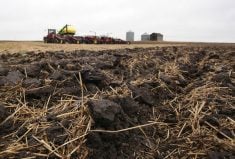Producers are warned that environment, social and governance standards could have sweeping implications for them
Glacier FarmMedia – Sustainability disclosure could soon become standard in many international markets, such as the United States and the European Union, a recent conference organized by the Canadian Agri-Food Policy Institute was told.
To illustrate how this could affect Canada, Isabelle Mégré, director of the IFRS Foundation’s Montreal office, gave the example of a California bill set to take effect in 2026 that would see large companies required to disclose climate-related financial risks, including value chain emissions.
“Canada was worth nine billion in 2023,” she said of Californian export money.
Read Also

Russian wheat exports start to pick up the pace
Russia has had a slow start for its 2025-26 wheat export program, but the pace is starting to pick up and that is a bearish factor for prices.
“We are actually California’s top agriculture and agri-food export market.”
David McInnes, founder of the Centre for Agri-Food Benchmarking, asked the speakers how environment, social and governance (ESG) standards can be created to apply to the disparate sectors of Canadian agriculture.
“The standards are not a one-size fits all as we might think,” Mégré said.
“It actually requires a lot of judgment and reflection from new companies that are using it.
“It might feel like a one-size-fits-all because there’s one set of standards. But really, when you dig into it, it’s about reflecting on what is affecting your company’s perspectives, your company’s business models.
“We’re trying to find this common place where it can fit for everybody.”
Bruce Marchand, interim chair of the Canadian Sustainability Standards Board, stressed the importance of having organizations such as his remain independent in this process.
“In some countries, the regulator sets the standard and the regulation at the same time,” he said.
“And in other countries, the regulator and the standards are separate, but they’re both an arm of government.
“I want to stress that our board is independent, so it’s not a government and it’s not a government board like our sister boards.”
Mégré warned that ESG regulation can be politically polarizing. She said this has created a fear of backlash among investors wanting to discuss ESG.
Another panel discussed upcoming policy such as the Jan. 1, 2025, implementation of the S1 and S2 of the ESG Sustainability Disclosure Standards as well as Bill C-59, which aims to increase green-washing accountability.
Michelle Leslie, senior manager of infrastructure and capital projects with Deloitte, expressed concern over the burden of proof that could be put on producers and businesses for their sustainability efforts in accordance with Bill C-59.
“There’s no standard as to what that burden of proof is,” she said.
Leslie said definitions of sustainability have not been sufficiently broadened beyond just environmental factors.
“If you achieve emissions reductions but it’s at the cost of bankrupting communities, if it’s at the cost of making people poor in the process, then I would say you have failed.”
Greg Northey, Pulse Canada vice-president of corporate affairs, said ESG goals are not as important to Canadian producers and consumers as are other economic development goals.
“From an agricultural sector perspective, we’re still very much focused on how do we become the best, most competitive producer in these global markets,” he said.
“And a lot of the time, sustainability, ESG, is not as much an issue.”
Selene Munro, United Farmers of Alberta’s sustainability director, said more attention should be paid to cost and scope when creating ESG standards.
“There is a cost to implementing or building or consolidating these standards. Not all programs are built out. There is no understanding of scope.
“A lot of those organizations will not meet the requirements for reporting because they’re not publicly traded.…
“The companies that are publicly traded are going to need or require that data from individuals within the supply chain, and that will go down to producers.”
The panelists also highlighted the importance of data collection for influencing public policy.
The conference also discussed questions about disclosure standards and a national index as well as the importance of consolidation and issues with limited awareness of the standards.
Speakers also addressed the importance of translating tenets of the International Sustainability Standards Board so that they are relevant to ag-specific data tracking.
Tarra Drevet from the Centre for Agri-Food Benchmarking stressed the importance of quality information and communication of data.
“I think we can be optimistic about what’s coming up next,” she said.
















